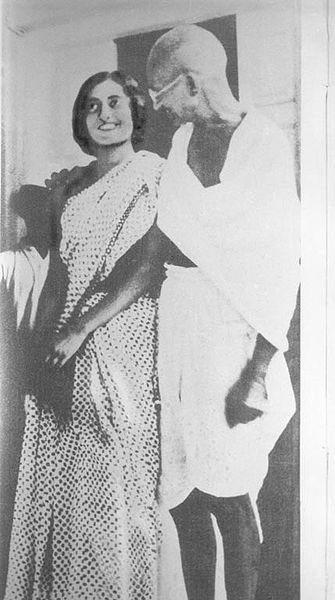Indira Gandhi
Indira Priyadarshini Gandhi (Hindi: इंदिरा प्रियदर्शिनी गांधी Indirā Priyadarśinī Gāndhī) (born 19 November 1917 – 31 October  1984) was the Prime Minister of the India for three consecutive terms from 1966 to 1977 and for a fourth term from 1980 until her assassination in 1984. She was India’s first and, to date, only female Prime Minister.
1984) was the Prime Minister of the India for three consecutive terms from 1966 to 1977 and for a fourth term from 1980 until her assassination in 1984. She was India’s first and, to date, only female Prime Minister.
Early Life and Education
Gandhi was born November 19, 1917, in Allahabad, India, to Jawaharlal and Kamala Nehru. A key turning point occurred very early on in her life, when Mohandas Gandhi, the pacifist leader of the Indian freedom movement, befriended her father. With Gandhi, her parents campaigned and often imprisoned for their activities.
She undertook undergraduate studies at Somerville College, Oxford, in 1936. Whilst in Europe, she met a young Parsi man active in politics, Feroze Gandhi (no relation to Mohandas Gandhi). They married upon their return to India in 1942 despite opposition from her father. Feroze and Indira were both members of the Indian National Congress, and when they took part in the Quit India Movement in 1942, they were both arrested. After independence, Feroze went on to run for election and became a member of parliament from Uttar Pradesh. They had two sons, Rajiv Gandhi and Sanjay Gandhi.
Political Career
In 1947, Indira’s father Jawaharlal Nehru became prime minister. On Nehru’s death in 1964 she was elected to Parliament in his place. In 1959, Prime Minister Lal Bahadur Shastri appointed Indira Gandhi as minister of information and broadcasting. This position was the fourth highest ranking position in the Cabinet. As minister, she most importantly encouraged the making of inexpensive radios and started a family planning program.
Prime Minister
After the death of prime minister Shastri in 1966, Indira Gandhi served as prime minister until India held the next election. She won that election, and in 1967, became one of the first women ever elected to lead a democracy. In 1971, Gandhi was re-elected by campaigning with the slogan “Abolish Poverty.” However in 1975, Gandhi was found guilty of violating election laws. Later, the conviction was overturned by the Supreme Court of India.
War with Pakistan 1971
An influx of refugees from East Pakistan into India due to alleged atrocities committed by the Pakistan army led Gandhi to declare war on Pakistan. Victory for India in 1971 led to the creation of Bangladesh.
Foreign policy
She invited the new Pakistani President Zulfikar Ali Bhutto for a week-long summit. After the near-failure of the talks, the two heads of state eventually signed the Shimla Agreement, which bound the two countries to resolve the Kashmir dispute by negotiations and peaceful means. Due to her antipathy for US President Nixon, relations with the United States grew distant, while relations with the Soviet Union grew closer.
Domestic Problems
To secure her power and because of escalating riots, on June 26, 1975, Indira Gandhi declared a state of emergency which limited the personal freedom of Indians. Also, she ordered the arrests of the main opposition leaders. In her opinion, her dictatorship was for the good of India. But she allowed free elections in 1977, and the Indian people voted her out of office.
She regained her position as prime minister in 1980.
Operation Blue Star and Assassination
In September 1984, Jarnail Singh Bhindranwala ‘s separatist Sikh militant group took up positions within the precincts of the Golden Temple, Sikhism’s holiest shrine. Despite the presence of thousands of civilians in the Golden Temple complex at the time, Gandhi ordered the Army into the shrine in an attempt to clear it of the militants. Accounts differ in the number of military and civilian casualties. Government estimates include four officers, seventy-nine soldiers, and 492 militants; other accounts are much higher.
Indira Gandhi had numerous bodyguards, two of whom were Satwant Singh and Beant Singh, both Sikhs. On 31 October 1984 they assassinated Indira Gandhi with their service weapons in the garden of the Prime Minister’s Residence at No. 1, Safdarjung Road in New Delhi. As she was walking to be interviewed by the British actor Peter Ustinov filming a documentary for Irish television, she passed a wicket gate, guarded by Satwant and Beant. Beant Singh was shot dead and Satwant Singh was shot and arrested by her other bodyguards.
References
- http://en.wikipedia.org/wiki/Indira_Gandhi
- http://www.indiragandhi.com/history.html
- http://departments.kings.edu/womens_history/igandhi.html


